
by Steve | Aug 31, 2016 | July-Aug2016, Magazine, Magazine Articles
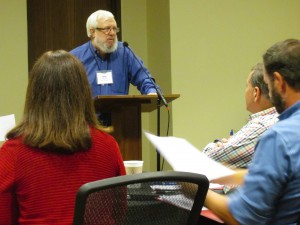
Dr. William J. Abraham, professor at Perkins School of Theology in Dallas, addresses the Wesleyan Covenant Association gathering.
WCA Press Release
The newly launched Wesleyan Covenant Association (WCA) is a membership-driven initiative to link congregations, clergy persons, and laity to “promote the ministry of the gospel from a Wesleyan theological perspective within The United Methodist Church and kindred bodies,” according to bylaws adopted by nearly 50 United Methodist leaders gathering in Houston on August 1 and 2.
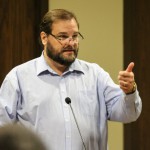
Dr. Chris Ritter
“We are a movement of like-minded, warm-hearted, Jesus loving, Wesleyan, evangelical, orthodox, and covenant-keeping Christians who are connected together in mission,” said the Rev. Dr. Jeff Greenway, lead pastor of Reynoldsburg (Ohio) United Methodist Church.
The group gathered to adopt bylaws and nominate a first slate of Council members that will be elected at their initial public gathering on October 7 in Chicago at the Donald E. Stephens Convention Center. Information on the Chicago event can be found online at WesleyanCovenant.org.
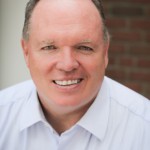
Rev. Jeff Greenway
“Our meeting was both serious and hopeful,” said Dr. David Watson, academic dean at United Theological Seminary in Dayton, Ohio. “We prayed together, broke bread, shared ideas, agreed and disagreed, and learned from each other. We affirmed together that we are not another caucus group, but a community established for mutual encouragement, resourcing, and accountability. We simply want to embody Wesleyan holiness in a way that is already articulated in United Methodism’s Doctrinal Standards, but is often set aside in actual practice.”
In addition to Watson, other prominent United Methodist theologians in the group included Dr. Billy Abraham of Perkins School of Theology in Dallas and Dr. Bill Arnold of Asbury Theological Seminary in Wilmore, Kentucky. There were clergy and laity representatives from all five jurisdictions in the denomination, including from embattled annual conferences such as Rocky Mountain, New York, and Iowa.
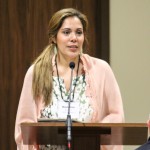
The Rev. Madeline Carrasco Henners
“As a young orthodox United Methodist, I am excited about the creation of the Wesleyan Covenant Association as a coalition committed to the authority of God’s Holy Word, our Wesleyan heritage, and Holy Spirit empowered revival,” said the Rev. Madeline Carrasco Henners, pastor of Luling (Texas) First United Methodist Church. “We know that many pastors in many progressive annual conferences feel isolated from their fellow orthodox brothers and sisters. This alliance will help them have their voices heard in matters affecting the unity of the global church.”
Morning devotional messages were brought by the Revs. Ryan Barnett, Kerrville (Texas) United Methodist Church, and Carolyn Moore, senior pastor of Mosaic United Methodist Church in Evans, Georgia. The concluding service of holy communion was conducted by Henners and the Rev. Jessica LaGrone, dean of the chapel at Asbury Theological Seminary.
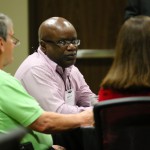
The Rev. Kenneth Levingston (center)
The group established that one of its main purposes was to “promote the worship of the Holy Trinity, to preach the pure Word of God, to uphold the rich tradition of sacramental practice, to maintain Christian fellowship, to foster the edification of believers, and to welcome and advance the work of the Kingdom of God on earth.”
“During this time of so much uncertainty in United Methodism, the Wesleyan Covenant Association is bringing a fresh voice of hope, strength, and encouragement to those seeking traditional Biblical values,” said Jennifer Cowart, executive pastor at Harvest Church in Warner Robbins, Georgia.
“The United Methodist Church has a rich heritage of reaching people for Christ and helping them grow into mature disciples. However, we now find ourselves at a crossroads of what the future holds for our tribe. The WCA provides a network of like minded laity and clergy who cherish biblical traditional values.”
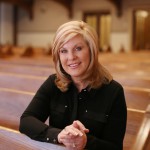
Jennifer Cowart
An erroneous report on the online version of Charisma magazine claimed that the WCA was ready to create a new denomination. Charisma issued a second story to correct their faulty reporting. Furthermore, Bishop Bruce Ough, president of the United Methodist Council of Bishops, inappropriately blamed the formation of the Wesleyan Covenant Association as having “opened deep wounds and fissures within The United Methodist Church and fanned fears of schism.” (See page 24.)
Leaders at the event agreed that both cases of severe mischaracterization should be retracted and corrected.
“Some have jumped to the conclusion that the formation of the Wesleyan Covenant Association is an effort to force schism and start a new denomination,” said Greenway. “I can understand why some might say that because these are confusing times and many forces are at play in the United Methodist family trying to shape what is to come. I can say unequivocally that we are not creating or starting an effort to leave our denomination, but we are developing an association of churches and leaders who are committed to live and practice what we say we believe.”
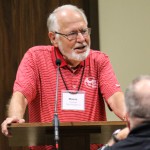
Dr. Maxie Dunnam
Those in attendance at the meeting want to be active in responding to the upcoming Council of Bishops’ commission that will bring proposals to shape the future of The United Methodist Church.
“We do not know what that will be, but we do believe that change is coming,” said Greenway. “As we live into what comes next, the WCA is committed to preserving the core of what we believe and practice as United Methodists. We are not leading a separation, but we are committed to being faithful to our convictions.”
The commitment to faithfulness in uncertain times was a shared sentiment at the gathering. “Christianity was born in a hostile culture. We were born in the Roman empire, that tried to destroy Christianity. And so it’s not the culture that’s going to determine who we are, it’s our faith,” said the Rev. Kenneth Levingston, senior pastor of Jones Memorial United Methodist Church in Houston. “It’s whether or not we’re willing to stand up in the culture and love it and still call it to live in a faithful way and manner with Jesus Christ.”
Wesleyan Covenant Association press release. The WCA offers email updates at www.wesleyancovenant.org/contact-us.

by Steve | Aug 31, 2016 | July-Aug2016, Magazine, Magazine Articles
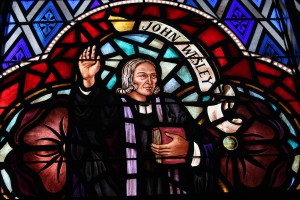
Stained glass window depicts Methodism’s founding father, John Wesley. Photo by Ronny Perry, United Methodist Communications.
As clergy and lay leaders of healthy, vibrant, and orthodox United Methodist congregations, and as teachers preparing the future clergy leaders of our denomination, we welcome the creation of the Wesleyan Covenant Association. In these times of great uncertainty about the future of The United Methodist Church, we believe it is important for orthodox congregations, clergy, and laity to work together, to support one another, and to encourage each other. We long for a church committed to sharing the Gospel of Jesus Christ with the last, the least, and the lost.
Committed to the Wesleyan expression of orthodox Christianity, we believe the church can and must do better. We are alarmed by the growing loss in average worship attendance in many of our annual conferences. We regret the now numerous instances where colleagues in ministry have broken covenant with the rest of the church and sowed the seeds of schism. We are grieved by the actions of annual conferences that have decided not to conform to our Discipline. And we are disappointed in leaders who have failed to maintain the good order of the church. Consequently, the work of faithful pastors and laity has been undermined, healthy congregations have left the denomination, and thousands of United Methodists have gone in search of other places to worship and serve.
We believe the Wesleyan Covenant Association will give orthodox United Methodists hope for the future and serve as a source of encouragement as the church works through a critical period of discernment. We want to serve in close partnership with our brothers and sisters in Africa, Europe and the Philippines. And we want to be prepared to act as one in light of the important work and recommendations of the Bishops’ Commission on the Future of the Church. We encourage all orthodox clergy and laity to remain steadfast and faithful in these uncertain times. We believe the Wesleyan Covenant Association will bind us together and make us a strong, united witness for Scriptural Christianity.
We believe that God is “doing a new thing.” We believe a new and better day is coming for the people called Methodist who are committed to the Lordship of Jesus Christ, the authority of the Scriptures, and the church’s being a missional force determined to reach a lost culture. We yearn to step into this new future together with others of like minds and hearts.
Please visit the Wesleyan Covenant Association website (www.wesleyancovenant.org) to learn more about it. We also hope you will plan to join us in Chicago on October 7, 2016, for the first gathering of the association.
We are confident you will be hearing more about the association in the weeks and months ahead, and we trust you will join us as we band together for the sake of a vibrant, Wesleyan expression of orthodox Christianity.
In Christ,
Billy Abraham, Perkins School of Theology, Dallas, Texas
Bill Arnold, Asbury Theological Seminary, Wilmore, Kentucky
Ryan Barnett, Kerrville First UMC, Kerrville, Texas
Keith Boyette, Wilderness Community UMC, Spotsylvania, Virginia
Larry Bryars, Frazer UMC, Montgomery, Alabama
Madeline Carrasco Henners, Luling First UMC, Luling, Texas
Kenneth J. Collins, Asbury Theological Seminary, Wilmore, Kentucky
Ferrell Coppedge (lay), Mt. Bethel UMC, Marietta, Georgia
Bryan Collier, The Orchard UMC, Tupelo, Mississippi
Jennifer Cowart (lay), Harvest UMC, Byron, Georgia
Jim Cowart, Harvest UMC, Byron, Georgia
Dan Dalton (lay), Dalton & Tomich, Detroit, Michigan
Joe DiPaolo, First UMC, Lancaster, Pennsylvania
Maxie Dunnam, Christ UMC, Memphis, Tennessee
Walter Fenton, Good News, The Woodlands, Texas
Scott Field, Crystal Lake UMC, Crystal Lake, Illinois
John Gaulke, Altoona UMC, Altoona, Iowa
John Gerlach, Trinity UMC, Windsor, Connecticut
Tommy Gray, Asbury UMC, Madison, Alabama
Jeff Greenway, Reynoldsburg UMC, Reynoldsburg, Ohio
Joy Griffin (lay), International Leadership Institute,
Carollton, Georgia
Wes Griffin, International Leadership Institute,
Carollton, Georgia
Daniel Hannon, Christ UMC, The Woodlands, Texas
Jeff Harper, Evangelical UMC, Greenville, Ohio
Tom Harrison, Asbury UMC, Tulsa, Oklahoma
Jeff Jernigan (lay), Powder Springs, Georgia
Randy Jessen, Parker UMC, Parker, Colorado
Rick Just, Asbury UMC, Wichita, Kansas
Charles Kyker, Christ UMC, Hickory, North Carolina
Jessica LaGrone, Asbury Theological Seminary, Wilmore,
Kentucky
Thomas Lambrecht, Good News, The Woodlands, Texas
Jim Leggett, Grace Fellowship UMC, Katy, Texas
Kenneth Levingston, Jones Memorial UMC, Houston, Texas
Greg McGarvey (retired elder), Indiana Annual
Conference, Fishers, Indiana
Andrew B. Miller (lay), Franklin, Tennessee
Pat Miller, (lay) The Confessing Movement, Indianapolis,
Indiana
Carolyn Moore, Mosaic UMC, Evans, Georgia
Mike Morgan, Marion First UMC, Marion, Iowa
Norman Neel (lay), San Augustine, Texas
Martin Nicholas, Sugarland UMC, Sugarland, Texas
Craig Peters, Shueyville UMC, Shueyville, Iowa
Jody Ray, Mt. Bethel UMC, Marietta, Georgia
Rob Renfroe, The Woodlands UMC, The Woodlands, Texas
Chris Ritter, Geneseo First UMC, Geneseo, Illinois
Ed Robb III, The Woodlands UMC, The Woodlands, Texas
Chuck Savage, Sardis UMC, Atlanta, Georgia
Branson Sheets, Covenant UMC, Winterville, North Carolina
Stephen Sparks, Indianola UMC, Indianola, Mississippi
Shane Stanford, Christ UMC, Memphis, Tennessee
Greg Stover (retired elder), West Ohio Annual Conference,
Lake Waynoka, Ohio
Andrew Thompson, Springdale First UMC, Springdale,
Arkansas
Richard Thompson, First UMC, Bakersfield, California
David Watson, United Theological Seminary, Dayton, Ohio
Ken Werlein, Faithbridge UMC, Spring, Texas
Max Wilkins, The Mission Society, Norcross, Georgia
* Church names provided only for identificational purposes.

by Steve | Aug 31, 2016 | July-Aug2016, Magazine, Magazine Articles
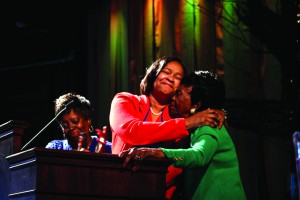
The Rev. Sharma Lewis, center, of the North Georgia Conference was the first African-American woman elected bishop by the Southeastern Jurisdiction. Photo by Ansley Brackin.
During July, the five U.S. jurisdictional conferences elected 15 new bishops. According to United Methodist News Service stories, the newly elected bishops are:
• The Rev. Sharma Lewis: In a historic election, Lewis of the North Georgia Annual Conference was elected bishop by the Southeastern Jurisdiction on the first ballot. She is the first African-American woman elected bishop in the Southeastern Jurisdiction.
“I was called by God and I made myself available, not just to a position, but to follow God’s will,” said Lewis. “I am excited, and I am really humbled. At 52 years old, I am excited that my next phase of life will be as an episcopal leader. I am humbled to the fact that this is historic.” With degrees from Mercer University, The University of West Georgia, and Gammon Theological Seminary, Lewis will lead the Virginia Annual Conference.
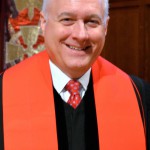
The Rev. David Graves
• The Rev. David Graves, senior pastor of Church Street United Methodist Church in the Holston Conference, was elected by delegates of the Southeastern Jurisdiction. Graves, 58, was elected on the fourth ballot.
“I want to thank you, the Southeastern Jurisdictional Conference, for putting your faith in me,” Graves said after his election. “So we go forth to win people to Christ, see the unseen, transform lives, and help The United Methodist Church change the world.” With degrees from University of Tennessee and Candler School of Theology, Graves will lead the Alabama- West Florida Annual Conferences.
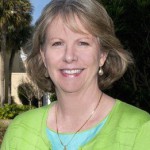
The Rev. Sue Haupert-Johnson
• The Rev. Sue Haupert-Johnson, a district superintendent of the Florida Annual Conference, was elected by delegates at the Southeastern Jurisdictional Conference. Haupert-Johnson, 54, was elected on the 10th ballot. In her introduction address on Tuesday, Haupert-Johnson stressed the need for the church to have room for everyone at God’s table. “I hope you will go and spread a table ‘with a sumptuous gospel feast,’” she bid the delegates. With degrees from University of Florida and Candler, Haupert-Johnson will lead the North Georgia Annual Conference.
• The Rev. Robert Lawson Bryan, of the Alabama-West Florida Conference, was elected by the Southeastern Jurisdiction. Bryan, who serves as senior pastor at Montgomery (Alabama) First United Methodist Church, was elected on the 10th ballot. “It is an honor to be elected by colleagues in our jurisdiction and to see God at work,” he said. ”For the past year, I have referenced Ephesians 2:5, ‘alive together in Christ,’ and ask for your prayers as I seek God’s will as a leader in our SEJ Conference.” With degrees from Tulane
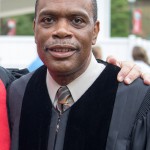
The Rev. Leonard Fairley
University and Emory University, Bryan will lead the South Georgia Annual Conference.
• The Rev. Leonard Fairley, district superintendent in the North Carolina Conference, was elected by the Southeastern Jurisdiction. Fairly, 59, was elected on the seventh ballot. “My request for you, my brothers and sisters, is to pray for me that I might live into the fruit of the Spirit,” he told the delegates. He added that he believes The United Methodist Church’s best days are still ahead. Fairley served as the chief missional strategist and spiritual and administrative leader to 96 churches and 134 pastors in 56 eastern North Carolina counties. With degrees from Pfeiffer College and Duke University’s School of Divinity, Fairley will lead the Kentucky and Red Bird Missionary Annual Conferences.
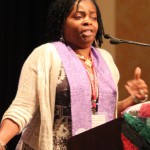
The Rev. Cynthia Moore-Koikoi
• The Rev. Cynthia Moore-Koikoi, district superintendent of the Baltimore-Washington Conference, was elected as a bishop on the 11th ballot at the Northeastern Jurisdiction. She played a pivotal spiritual role in the city following the unrest in 2015 around the death of Freddie Gray in police custody.
“My heart is so full,” said Moore-Koikoi as she stood at the podium. “I don’t have the words. All I can say is glory, hallelujah!” Holding her husband’s hand – the Rev. Rafael Koikoi serves Sharp Street Memorial in Baltimore – Moore-Koikoi said that she knows being elected is a sacred trust. “I’m gonna need your prayers so that I can fulfill that trust,” she said. “I give each of you permission to pull me aside when I might be going astray. God spoke through you tonight, and that’s gonna continue.” With degrees from Loyola College and the University of Maryland, Moore-Koikoi will lead the Western Pennsylvania Annual Conference.
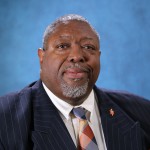
Bishop Frank Beard. Photo by North Central Jurisdiction.
• The Rev. Frank Beard, pastor of Castleton United Methodist Church in Indianapolis, was elected by delegates at the North Central Jurisdiction. He was elected on the sixth ballot. Beard told delegates that in 1968, he was a “snotty-nosed” kid playing around a United Methodist church when its members invited him for cookies and Kool-Aid — and then provided a scholarship so he could attend a United Methodist camp. “That little Methodist Church took me under their wing,” he said. “In 1968, it wasn’t popular for white churches to invite little black boys to be part of their congregation.” Beard said that church blessed him and God called him to the glorious task of preaching the good news.
With degrees from Taylor University, Asbury Theological Seminary, and Christian Theological Seminary, Beard will lead the Illinois Great Rivers Annual Conference.
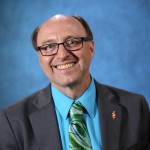
The Rev. David Bard
• The Rev. David Bard, the pastor of First United Methodist Church in Duluth, Minnesota, was elected by the North Central Jurisdiction. Bard was elected during the 10th round. He’s the first bishop to be elected from Minnesota in more than four decades.
Addressing delegates from the podium immediately after his election, Bard gave thanks to God, whose love in Jesus Christ he said touched a 13-year-old in a United Methodist church in Duluth, Minnesota — the same place he now serves. “I pledge with God’s grace and the help of God’s spirit and all of your help to work to make The United Methodist Church the best it can be, for us to be a church that indeed offers hope and healing in a broken and battered world,” he said.
With degrees from University of Minnesota, United Theological Seminary of the Twin Cities, and Southern Methodist University, Bard will lead the Michigan Area Annual Conference.
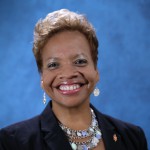
The Rev. Tracy Smith Malone
• The Rev. Tracy Smith Malone, district superintendent in the Northern Illinois Conference, was elected by the North Central Jurisdiction. “To God be the glory. Friends, I stand before you as one who feels very blessed. Blessed for the journey, by your prayers and confidence in my leadership. I am a child of a church. You raised me and formed me. I consider it a privilege and an honor to serve the church,” said Smith Malone after being introduced as a bishop of The United Methodist Church.
With degrees from North Central College, Garrett-Evangelical Theological Seminary, and United Theological Seminary, Malone will lead the East Ohio Annual Conference.
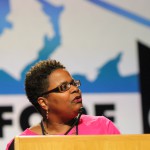
The Rev. LaTrelle Easterling
• The Rev. LaTrelle Easterling, a district superintendent in the New England Annual Conference, was elected by delegates at the Northeastern Jurisdiction on the 17th ballot. Easterling told the member conferences of the Northeastern, “I always, always, always stand on the side of justice, but I draw the circle wide enough for all of us to be there – and when I say all, I mean all.”
With degrees from Indiana University, Indiana School of Law, and Boston University School of Theology, Easterling will lead the Baltimore-Washington Annual Conference.
• The Rev. Dr. Ruben Saenz Jr., director of Connectional Ministries and executive director of Mission Vitality Center of the Rio
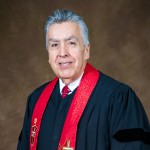
The Rev. Dr. Ruben Saenz Jr.
Texas Conference, was elected by delegates at the South Central Jurisdiction on the third ballot. Saenz said he didn’t set out to be an episcopal leader, but over the years, people have talked to him about the possibility of putting his gifts to use as a bishop. “I think of it as drops in a sponge,” he said. “The first 100 drops are insignificant but after a while, it gets heavy and saturated. It was the affirmation of many people I’ve been associated with over the years.
“It has been a long season of discernment.” He said he didn’t want to be elected just because he is Hispanic but because delegates discerned that he would serve effectively as an episcopal leader. “We are leaders for all peoples,” he said. With degrees from Stephen F. Austin State University and Perkins School of Theology, Saenz will lead the Great Plains Annual Conference.
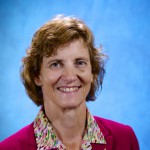
The Rev. Laurie Haller
• The Rev. Laurie Haller, senior pastor of First United Methodist Church in Birmingham, Michigan, was elected by delegates at the North Central Jurisdiction on the 13 ballot.
“I am the first bishop ever to be elected with a visible black eye,” she said, addressing the body after election. “I got it from a stray piece of airplane luggage and decided not to cover it up. It reminds me that I offer myself in utter transparency, honesty, and vulnerability. It reminds me of all who live under oppression and those with wounds so deep that no one knows they exist.” With degrees from Yale University Divinity School and Wittenberg University, Haller will lead the Iowa Annual Conference.
• The Rev. James “Jimmy” Nunn, the director of mission and administration for the Northwest Texas Conference, was elected by
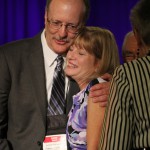
The Rev. James “Jimmy” Nunn hugs wife, Mary, after his election as a bishop. Photo by Todd Seifert.
the South Central Jurisdictional Conference. Nunn, 59, was selected on the 21st ballot. “This is where I need to be, where I need to invest my life,” Nunn said of his call to the position.
Nunn has been mission and administration director of the Lubbock, Texas-based conference since 2011, serving for two years before that as the Northwest Texas Conference’s director of church development. With degrees from McMurry University and Asbury Theological Seminary, Nunn will lead the Oklahoma and Oklahoma Indian Missionary Annual Conferences.
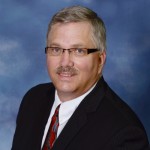
The Rev. Robert “Bob” Farr
• The Rev. Robert “Bob” Farr, director of of congregational development for the Missouri Conference, was elected by the South Central Jurisdiction. Farr, 56, has served as the director of the Center for Congregational Excellence since 2007, guiding 35 church starts and overseeing more than 150 Healthy Church consultations in the Missouri Conference. He also has led 128 individual church consults in 29 conferences across the connection.
“It was an emotional roller coaster,” Farr said of the extended ballots. “It meant a lot to have the support from the conference, the clergy, and the lay people here.” With a degree from Perkins School of Theology, Farr will lead the Missouri Annual Conference.
• The Rev. Dr. Karen Oliveto, senior minister of Glide Memorial United Methodist Church in San Francisco, was elected by the Western. With degrees from Drew University and Pacific School of Religion, Oliveto will lead the Rocky Mountain and Yellowstone Annual Conferences. (See pages 8-12.)
Profiles adapted from United Methodist News Service reports. Special thanks to contributing news writers Sybil Davidson, Annette Spence, Mary Catherine Phillips, LeeAnne Thornton, Melissa Lauber, Erik Alsgaard, Christa Meland, Joey Butler, Beth DiCocco, David Burke, and Kathy L. Gilbert.

by Steve | Aug 31, 2016 | July-Aug2016, Magazine, Magazine Articles

Kodi Smit-McPhee portrays Nightcrawler in X-Men: Apocalypse (Twentieth Century Fox).
By Steve Beard-
When moviegoers were first introduced to Kurt Wagner more than a dozen years ago in the blockbuster film X2: X-Men United, he was darting through a legion of hapless Secret Service officers at the White House. At first glance, he appeared as a fierce blue demon-looking character that was able to disappear into thin air and reappear across the room.
For those who don’t follow the alternative universe of comic book imagination and discussions of “mutants,” Wagner is one of the most fascinating characters introduced in the X-Men franchise.
Wagner’s appearance in X2 (played by Alan Cumming) delighted comic book fans. His character is better known as Nightcrawler (or Fuzzy Elf to his friends). As a “teleporter,” the German-accented mutant is able to morph into a puff of blue smoke and transport himself with the speed of sound. With acrobatic grace, he cuts quite an image with his dark blue skin, tail, pointy ears, three-fingered-hands, and funny teeth.
There was more than a ripple of thrill coursing through the veins of comic book fans when it was announced that Nightcrawler would reemerge in this year’s blockbuster X-Men: Apocalypse. Mysteriously, the character has been absent from the last five films in the series.
Nightcrawler has been one of Marvel Comics’ most unique and complex superheroes since 1975. For those outside the X-Men cult of fans, the series revolves around a cast of characters that have some form of genetic mutation that manifests itself through extraordinary abilities. They have names such as Wolverine, Cyclops, Magneto, and Rogue. The mutants can control the weather (Storm), blow freezing cold wind (Iceman), or walk through walls (Kitty Pryde, aka Shadowcat). As you would expect, they are treated as freaks and ostracized from society. The storyline revolves around the struggle between the humans and mutants and the need to fight prejudice, suspicion, and bigotry when dealing with people who may have different looks or talents.
Perhaps the most intriguing characteristic about Nightcrawler is that he is a mutant of faith — a devout Christian. Out of all the myriad of cartoon superheroes created in the last fifty years, very few have articulated or been identified with a specific religious faith.
There have, however, been exceptions to the rule. In 2002, it was revealed in the comics that Ben Grimm (aka The Thing) of The Fantastic Four was Jewish. Clark Kent (aka Superman) was raised Methodist. In the movie Daredevil, crucifixes and other religious iconography flood the screen (as well as visits to the confessional) in order to convey Matt Murdock’s struggle between vigilantism and his boyhood Catholic faith.
To their credit, the screenwriters, director, and producers of X2 allowed Nightcrawler to retain his purity of faith and hope. They skipped the subtle, read-between-the-lines type of allusions to his Christianity and let him express full-metal devotion. Nightcrawler takes refuge in an abandoned cathedral in Boston, festooned with statues of Jesus. When he is nervous, he holds a crucifix and says the rosary in German. When he needs to summon inner strength, he recites the Lord’s Prayer. When the group is confronted with tragedy, he pastorally quotes Psalm 23.
Awash in hellfire, brimstone, and lazerbeams, X-Men: Apocalypse was this summer’s big screen spectacle loaded with melodramatic screen banter about false gods and Four Horsemen, all bursting out of the rubble of ancient Egyptian cults. While some observers rightfully complain when Hollywood turns its back on religion, it must be pointed out that some films overdose on discombobulated spirituality. Apocalypse may well have been one of those films.
In the midst of the metaphysical chaos of an X-Men film, you can thankfully depend on the pointy-eared blue character (this time played by Kodi Smit-McPhee) with the tail to make the sign of the cross and pray: “Dear Father, hold me in the light of God. Protect me from danger. Save me by your command. Listen to my prayer and keep me safe.”
Quite simply, Nightcrawler is one of the most devout and unconventional Christian characters that has ever been portrayed on the big screen. Furthermore, his distinct characteristics span his portrayal in comic books, graphic novels, and an animated film. He talks righteously about sin and the power of faith, without the slightest hint of holier-than-thouism. Although he has every right to be angry at humans for their bigotry, he chooses to help them. He has fears, but he acts with courage through the power of prayer. He quotes the Scripture to find strength that his genetically mutated special powers cannot give him.
In the movie version, Nightcrawler’s faith is further highlighted in that his body is covered in tattoos, one for each of his sins. He calls them his “angel marks.” In a form of penance, they are self-inflicted ancient Enochian symbols considered to be an angelic alphabet.
Good-natured swashbuckler
When Nightcrawler first began with the X-Men, he was not conceived as a religious superhero. He was a swashbuckling adventurer with a good sense of humor and a special charisma with the ladies. He even became the leader of the British superhero group Excalibur.
His unique look always made him appear to be something that he was not — namely a demon. The creators used his image to further press their point that prejudice and bigotry brutally cloud our judgment in being able to truly judge a person. This was only heightened when Nightcrawler began quoting Scripture, praying, and hanging out in abandoned cathedrals. He began to be mentored by a priest at Church of Michael the Archangel in Brooklyn and studying for the priesthood.
For a period of time in the X-Men comics, Nightcrawler was shown wearing a clerical collar and even presiding over the funeral of a friend. In the midst of his theological studies, he also struggles with his faith, the tremendous injustice that he sees all around him, and what it would mean to become a priest.
In the graphic novel Uncanny X-Men Vol. 1: Hope (2003, written by Chuck Austen), Nightcrawler is staring at a life-size crucifix in St. Patrick’s Cathedral when he says, “Your death was intended to show us a shining example of how we should live in loving union with you and those around us. Yet even those of us who hold you deepest in our hearts — fail — in keeping true to your divine word.”
In continuing his confession, he says: “Clergy, parishioners, priests — me. I have such thoughts — feelings I cannot escape — the desires for the touch of a woman.” While the temptations of the flesh weigh heavy on his conscience, Nightcrawler’s vastly more threatening challenge is against the racist and religious humans of the Church of Humanity, a Ku-Klux-Klan type of anti-mutant organization.
With the gritty and heart-torn anxiety of the Psalmist, his poignant monologue continues by unleashing his frustration on a seemingly standoffish God. “And now another Holy War is brewing — more fools take up weapons of murder in Your name. And You allow it. Perhaps even encourage it. If we take You into our hearts, does that mean fighting and killing in Your name — or not fighting and being killed in your name? Which is the right answer? And what purpose does it serve to torment your most faithful when the goal is maybe one day sitting beside you — alone — possibly forever apart from the ones we love and desire — who chose wrongly or failed your uncertain tests?”
The scene concludes with Nightcrawler looking at his crucified Jesus and saying, “When next we meet, I expect answers.”
Did God give up on the mutants?
With the heightened popularity of the X-Men movies, a DVD collection of animated TV episodes from the early 1990s was released entitled X-Men: The Legend of Wolverine (Buena Vista, written by Eric Lewald, Mark Edward Edens, and Sidney Iwanter). It includes an entire episode devoted to the origin and theological disposition of Nightcrawler.
The story takes place within a monastery in a small Bavarian village in Germany. Three of the X-Men (Wolverine, Gambit, and Rogue) find themselves being aided by monks in the aftermath of an avalanche. Having been mistaken for a demon by the townspeople because of his looks, Nightcrawler explains to Wolverine and his friends that his genetic mutations were evident from birth and that the villagers chased him and his mother out of town.
His mom (Mystique) also abandoned him as a child (in the comics, she throws him over a waterfall) and a family of travelling performers took him in. When he was young he was able to work in the circus, but he was still treated as an outcast, “shunned and hated.” In talking with Wolverine, Nightcrawler says, “Though all people are flawed and struggle with the capacity for sin, none likes to be reminded of our shared human weakness. My appearance does not make it easy.”
“Don’t it make you crazy?” Wolverine asks with incredulity.
“It did once, but then I found peace by devoting my life to God,” said Nightcrawler. “He directed me to this place [the monastery] where they value the character of my heart, not my appearance.”
This only sends Wolverine further into a rage. “What are you talking about? God gave up on us long ago!” Nightcrawler counters, “No, my friend, God does not give up on his children — human or mutant. He is there for us in our times of joy and to help us when we are in pain — if we let Him.”
Later, Nightcrawler tells Wolverine, “We are alike, you and I — angry at the world. My pain drives me to seek God, yours drove you away.” Wolverine is further infuriated when he asks why God would have allowed him to be treated so badly. “Our ability to understand God’s purposes are limited,” says Nightcrawler, “but take comfort in the fact that his love is limitless.”
The episode concludes with Wolverine kneeling in a French cathedral reading the Bible and saying, “I will give thanks to you O Lord. Though you are angry with me, your anger is turned away and you have comforted me. I will trust you. I will not be afraid.”
Not a bad message — especially coming from a thoroughly unconventional superhero.
Steve Beard is the editor of Good News.

by Steve | Aug 31, 2016 | July-Aug2016, Magazine, Magazine Articles
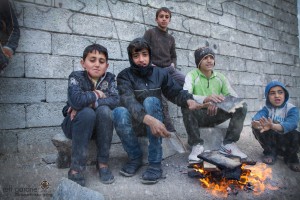
With nowhere to stay, Assyrian children try to keep warm during Iraq’s long winder. Jeff Gardner, Picture Christians Project, www.picturechristians.org.
By Courtney Lott-
At the age of sixteen, the Lord met Nastaran Farahani in a vision. While in the shower, she heard a voice telling her to repent and that she would be washed of her sins. Though at first she did not understand, God would soon make clear the message he had sent. Around the same time, Nastaran’s sister, who was then living in Holland, also received a message. A woman she knew came to her after having a vision in which she saw three women sitting on a bed, putting their trust in Christ. This friend gave her a Bible and told her she must go visit her family in Iran.
“When she got home to our family, she opened her bag and brought out a Bible and said, ‘I believe in Jesus.’ And all my family started to cry,” says Nastaran. “And I told her, ‘I believe in Jesus, I know Jesus, I do not know how, but I know him. I do not have any questions.’”
In spite of their initial reaction, the Lord was at work in the Farahani family. Within two months both of her Muslim parents came to know Christ as well and they all began to attend church. At the time, church buildings were still open in Iran, but when persecution came, they were no longer safe. The family then decided to gather at home, thus starting a house church. This marked the beginning of a long and difficult road for Nastaran. After returning to Iran from Dubai, she and her husband, Yuna Sabet, were arrested.
“When we arrived, the officer checked our passport and then called my name,” Nastaran says. “He took my bag and started searching. Then someone else told him to take my husband’s passport too. They took us to the separate room with no window and started to interrogate us. Lots of my close friends had been arrested in the past. One was held in jail for nine months. They were constantly telling her that she would be executed. So it was really scary for me.”
Believing that Christians planned to work against the Iranian government, the officers questioned Nastaran about her cell group. They wanted the names of
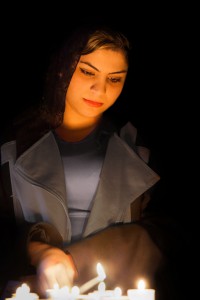
An Assyrian Christian refugee, living in Zarqa, Jordan, struggles to keep her faith and hope burning. Thousands like her are waiting to return to their homes on the Nineveh Plain in northern Iraq. Jeff Gardner, Picture Christians Project, www.picturechristians.org.
members who might have been connected to people outside of Iran and asked her what her plan was. Eventually, they let Nastaran go but kept her passport so she could not leave. Two or three times they called her in for further interrogation and did not release her husband for three months. During this difficult time, however, the Lord sustained her with his word.
“When I was interrogated, the word of Jesus in Matthew 10:19 came to me,” says Nastaran. “I was so scared and when I’m afraid I cannot talk. But I was given what to say just as Jesus promised. I told them things that would not have come up to me on my own. They kept telling me that I am a liar. He tested me to see if my hands were shaking. He offered me tea but I didn’t drink because I heard many stories about how they would give women something to drink that would make them fall asleep. I also heard stories of them raping women in the jail. And I was so scared of that.”
When they finally returned her passport, she was told to leave and never come back. In 2011, after years of serving the Lord in many closed countries including Iran, Turkey, Dubai, Syria, and Lebanon, Nastaran and her husband came to the United States. They now live with their two daughters in California, working with Farsi speakers from Iran, Afghanistan, and Tajikistan through church planting. When asked how persecuted Christians feel about their Western brothers and sisters, Nastaran says that they do not feel abandoned, but do believe that they don’t appreciate the religious freedom they have.
“We know it’s not easy for those in other parts of the world to understand what life is like in Iran or countries like Iran because they live in freedom and they can worship God without the fear of being arrested,” Nastaran says. “However, these days because of the influence of…social media, it’s easier to know and to be aware of the condition of the people who live under persecution. For the same reason people in the West are becoming more aware and are getting more involved in helping their brothers and sisters, which I know is very encouraging to the people in Iran. I do not think the Iranians feel abandoned or uncared by other Christians in the West. Because, as you might know, there was some Christian prisoner who had been released as a result of Christian support in the West. However, they might think that people who do live in free countries do not really appreciate their freedom and take it for granted.”
Nastaran went on to say that there are many more ways the Western church can show up for their persecuted brothers and sisters, beyond using a hashtag to bring awareness. “You can keep praying for them. I know that there were people praying for me while I was going through that difficult time and it’s really encouraging, when you’re undergoing persecution, to know that your brothers and sisters are standing with you by their support, prayers, and also keeping your situation in the news. The governments like Iran are afraid of losing their face because of the [negative publicity] against them. So spreading the news of persecution can be a huge help and hopefully help release them. There are many ways we can help our brothers and sisters such as writing a letter to them, talking to the government officially, or helping their family outside of prison.”
Courtney Lott is the editorial assistant at Good News. For more information, check out Barnabasfund.org, Persecution.com, Christianresponse.org, worldmag.com/iraqaid, Opendoorsusa.org, Servantgroup.org, or E-n.org.uk.

by Steve | Aug 31, 2016 | July-Aug2016, Magazine, Magazine Articles
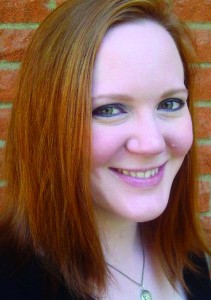
Elizabeth Glass Turner
By Elizabeth Glass Turner-
“Then justice will dwell in the wilderness, and righteousness abide in the fruitful field. The effect of righteousness will be peace, and the result of righteousness, quietness and trust forever.”
– Isaiah 32:16-17
The word righteousness isn’t one you see popping up on your Facebook and Twitter feed much these days.
Most people in North America would hear “righteous” and immediately translate it to “self-righteous.” And if there’s any taboo practice in an emerging or present post-Christendom culture, it’s self-righteousness: the inherent judgmental stance against others, in favor of yourself, based on supposed superiority of morality. Perhaps because of its very appearance and sound, there’s a halt, a slamming of the brakes. “Righteousness” begins visually and aurally, in English, with “right.” To say definitively that you’re immediately “right” in a pluralistic culture is a non-starter.
Of course “righteousness” doesn’t mean, “I’m right and therefore you’re wrong.” We speak here only of the instinctual response of the casual hearer who didn’t grow up hearing Psalms read from a teacher at the beginning of the public school day. “Righteousness” isn’t in our public vocabulary anymore.
To suggest a neutral or positive understanding of “righteousness” is challenge number one, and immediately we face challenge number two: the assertion that righteousness is the path to peace, that righteousness bears the promise of unsullied community. And yet this is what we read from Isaiah. While Old Testament scholars such as Drs. Sandra Richter and John Oswalt can give deeper insight to this passage in their commentaries, the 21st century reader still can’t escape this basic assertion: “The effect of righteousness will be peace, and the result of righteousness, quietness and trust forever.”
If there is a season in which Americans might be open to reconsidering the promise of righteousness, it might be now: now, when peace, quietness, and trust seem long ago and far-off. We hunger for peace, quietness, and trust. A truck plows through families celebrating in France, presidential campaigns are marred by inquiries, lawsuits, violence, and murky business dealings, a man following a law enforcement officer’s instructions is shot and killed in front of a four-year-old child, police officers are targeted and assassinated, a suicide bomber brings death and grief in Syria, and Baghdad, and Kabul, heroin scourges middle America, a teenager shoots up a church Bible study, a hostile nation steals information from our computers, an explosion rocks a German cafe, an agent teaching about cyber sex crimes accidentally catches a predator just in the few minutes she’s on a website during the seminar, a drone attack racks up significant “collateral damage,” a famous reporter admits embellishing an important story, veterans are returning with epidemic levels of PTSD, athletes’ performances are rigged with doping, the Zika virus decimates newborns.
The effect of righteousness will be peace, and the result of righteousness, quietness, and trust forever.
Glean from this verse a few quick observations: that righteousness exists; that righteousness has an effect; and that that effect is profoundly desirable.
In an age of global terrorism, we read: “the effect of righteousness will be peace, and the result of righteousness, quietness and trust forever.”
In the time-worn reality of immoral leaders, we read: “the effect of righteousness will be peace, and the result of righteousness, quietness and trust forever.”
In a century when you can wake up to bad news from all over the world instantly accessible on your night stand smart phone, we read: “the effect of righteousness will be peace, and the result of righteousness, quietness and trust forever.”
If this is what righteousness brings, it just might be worth pursuing.
Our society is beginning to think that the party might not have been worth the hangover. This is what “outgrowing” the Ten Commandments looks like. As well as shows with titles like “Scandal” and “Pretty Little Liars,” everyone really wants their friends to be trustworthy and their enemies to be honest. We want athletes’ performances to be honest (otherwise, what’s the fun of watching sports?), we want leaders who know that they too are under the law, we want our enemies to follow old rules of engagement that attempted to protect civilians from combat rather than deliberately targeting civilians.
In the end, we all really want peace, and trust. As we mature, we realize that the lure of drama to give self-importance is quickly hollow. Who doesn’t want a deep, profound sense of safety? And you cannot have true peace, quietness, and trust without righteousness, no matter what a political candidate says.
So the song, “Let There Be Peace on Earth, and Let It Begin with Me” is half right. But peace doesn’t begin with peace. Peace begins with righteousness: submitting to the boundaries of God’s covenant with us. Part of the whole theology of salvation that John Wesley preached to everyone – not just those with a head start in life, not just those with deep pockets who could help fund his ministry, but everyone – is the promise that God’s righteousness is good and just, that God’s righteousness fused with love has poured out to cover our unrighteousness, and that not only is our unrighteousness covered, but it can also be transformed. By God’s grace, we’re not only forgiven our unrighteousness, we’re empowered to live righteously.
“The effect of righteousness will be peace, and the result of righteousness, quietness and trust forever.” Creation groans, we eagerly await the fulfillment of the inbreaking Kingdom of God. Until that Day, we still live in a world with death and tears. But righteousness offers glimmers of that promise.
Do you want to live in a world of peace, quietness, and trust?
Put your faith in God, who will bring about his Kingdom where there will be no more crying or tears – and – live righteously. Do not covet, do not dishonor the Sabbath, do not give false witness, do not commit adultery, do not take on the name of God flippantly, do not dishonor your parents, and even more than these and the rest, love your enemies, walk farther than you are asked, don’t let your thoughts travel down dangerous roads even if you don’t act on them, think on things that are lovely and true and noble and trustworthy, discern and test, give thanks, pray constantly…
A tall order. “Peace, quietness, and trust aren’t possible, because no one can do all that,” you think. In the past one hundred years or so, Americans have set an ever-lowering bar for ourselves, shifting from being at least taught and trained and expected to adopt certain behaviors, to setting the training of our character aside, to saying, finally, that it’s just not possible and those who suggest it is are levying a moralistic power ploy. Make no mistake, as a society we’ve also improved significantly in many areas. But it is difficult to live the Christian life, and it is even more difficult if we do not train the character of our kids, ourselves, and each other.
Righteousness in part is character development. In part, it is accepting the grace of God that melts our hardened spirits and reforms us in Christlikeness. If I want to be part of a culture of righteousness, I must exert my will to pursue individual and communal character development, and I must also accept God’s transforming grace that will shape broken parts of me away from self-destruction and towards the Word Made Flesh.
“The effect of righteousness will be peace, and the result of righteousness, quietness and trust forever.”
So what are you doing to live a life of character and grace? Are your words honest and above-board? Do your thoughts betray ego or humility? Do you think certain standards are for others but not yourself? Are you both bold and gentle in your truth-speaking? Do you shift what you say in one context and change it in another, or at a different time, depending on how it serves your current desire?
Because the effect of righteousness? It’s peace. And the result of righteousness? Quietness and trust, forever.
Elizabeth Glass Turner is Associate Director of Community and Creative Development at World Methodist Evangelism and editor of WesleyanAccent.com. Reprinted by permission of WorldMethodist.org.


























